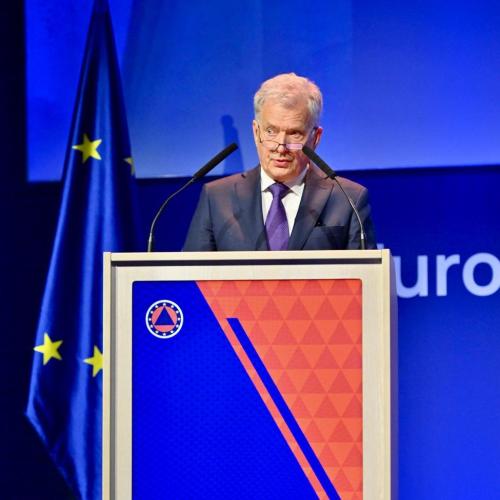This report sets out a thorough analysis of the challenges and calls for a whole-of-government, whole-of society, all-hazard approach, making a series of far-reaching recommendations for the EU. We asked President Niinistö to highlight some key points for European civil protection.
President Niinistö, what do you see as the biggest challenges for a better prepared Europe?
Stronger preparedness of the EU requires a new mindset: understanding that we share a single security and that preserving it is the precondition for maintaining our values and democratic political system, as well as our economic success and competitiveness. We need fully joined-up action to ensure that our societies can continue to function under all circumstances. Together we need to invest massively in civilian and defence capacities, anticipatory analysis, intelligence and coordination. Easier said than done. This is why I have been talking tirelessly to EU leadership, Ministers and key stakeholders about the urgent need to scale up and pull together all strands of preparedness.
We are living with increasing uncertainty and complexity and with more frequent disasters. In the EU we have high levels of interdependence and shared values, so together we must shape a clear vision and work hard to reinforce the building blocks of our societal resilience to disasters, shocks and disruption.
We heard you speak passionately at the European Civil Protection Forum last year about the need to engage citizens in crisis preparedness. Why do you think this is important?
Engaging citizens provides necessary skills to improve their own level of preparedness but also builds social cohesion as well as trust between the public and the authorities. When people understand the importance of preparedness and see their role in it, they can better protect themselves, cooperate with emergency measures and are more likely to support efforts bolstering preparedness.
We need all EU citizens to be better aware of risks and to take basic household and community preparedness measures. Here I hope other parts of the EU can learn from the Finnish experience, where we have an active whole of society approach to readiness, including maintaining emergency shelters, strategic stockpiling and a 72-hour home preparedness recommendation.
In my report, I call for EU action to support young people to become actively involved, through volunteering and through incentives to join the emergency and defence services workforce.
Finally, what more would you like to see from European civil protection in terms of a fully prepared European Union?
Civil protection authorities are the very backbone of civilian preparedness. I have seen that there is already an impressive degree of EU coordination through the Union Civil Protection Mechanism between the Member States. The area I have highlighted in my report that would need more engagement from you is to prepare for all types of crisis scenarios, including conflict consequences or hybrid attacks. This needs much closer planning and regular operational coordination, including with the military. You all know well that it is better to do this in a preparedness phase, than in the heat of response.
